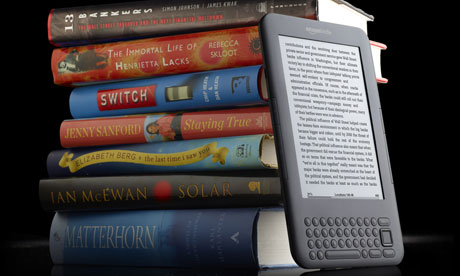
On the day Independent Booksellers Week begins, I feel I should confess: I've become a Kindle owner. Look, sometimes these things just happen, OK? It's not as if I planned it. I started research for a book about the history of children's literature and was soon faced with a stark choice: disburse money and time I do not have acquiring dozens of early 19th-century tales with titles such as The History Of The Crumbshaw Family and How God Smote Them All, Starting With The Baby, As Painfully As He Could For Bogglingly Minor Transgressions; or download free versions in seconds on to a portable device that would obviate both.
So I bought it for work. But there's been mission creep. I discovered that because you don't need to hold it open, you can easily read during meals (no more wedging of book under plate and destabilising your dinner), while drying your hair/dishes and through many other tediously necessary parts of life. You can read in bed even after your other half has demanded lights out, because it provides its own illumination. And I imagine that if I hadn't long ago stopped using my hands during sex, it would make it even easier to read through that, too.
Of course, you don't want to be reading stuff for work all the time, so I started downloading other books, too. Plus shelving space is at a premium in this already bibliographically-overstuffed house, so saving a few inches – well, a few feet now – is A Good Thing, too.
But. But, but, but, but, but. I know. With every download, I'm depriving my local and beloved indies – the Crow on the Hill, Kirkdale Books, Beckenham Bookshop, Tales on Moon Lane, Dulwich Books, Chener Books and all the doughty south-east London rest of them* – of revenue and instead adding to Amazon's legally sound, ethically decidedly iffy gains. And I can't go mentioning them every week to expiate my guilt, can I?
Moreover, all the advantages of the Kindle are external. The device itself remains inimical to "proper" reading – deep reading, immersive reading, the kind of reading that makes you understand the point of reading, that makes you feel the author's and his or her characters' consciousnesses open up in yours and actually, literally change your mind. The smooth affectlessness of the screen is pervasive. The ticker in the corner that tells you what percentage of the book you have left, and how long it will – could? should? – take to finish, turns reading into a race against the clock, while the value of being able to look up words and other people's notes must be set against the way their presence divides the mind against itself and pitches the reader perennially out of the moment.
Maybe this is not true if you have grown up with it. But I wonder. If the screen was all I knew (supplemented only with forced marches through Gove-set texts at school), would I naturally intuit there was another way of doing things? Would I realise that though the costs in time and effort were greater, the benefits would eventually dwarf them all? I don't think so. What will they know of Kindles who only Kindles know?
Well, better get back to the screenface, I suppose. I've a lot of skim-reading to do.
*Although, thanks to people like me, that may be all of them.

